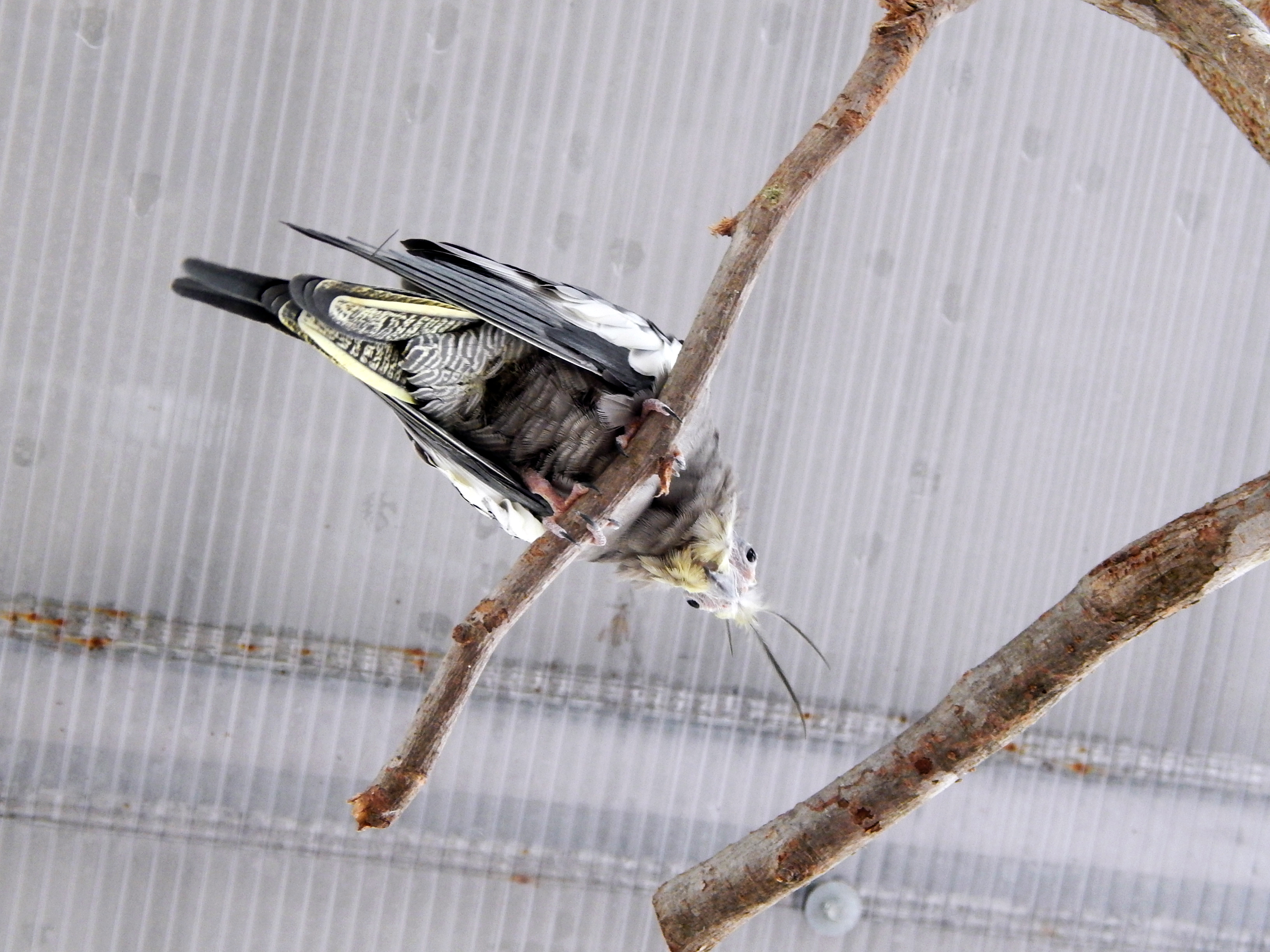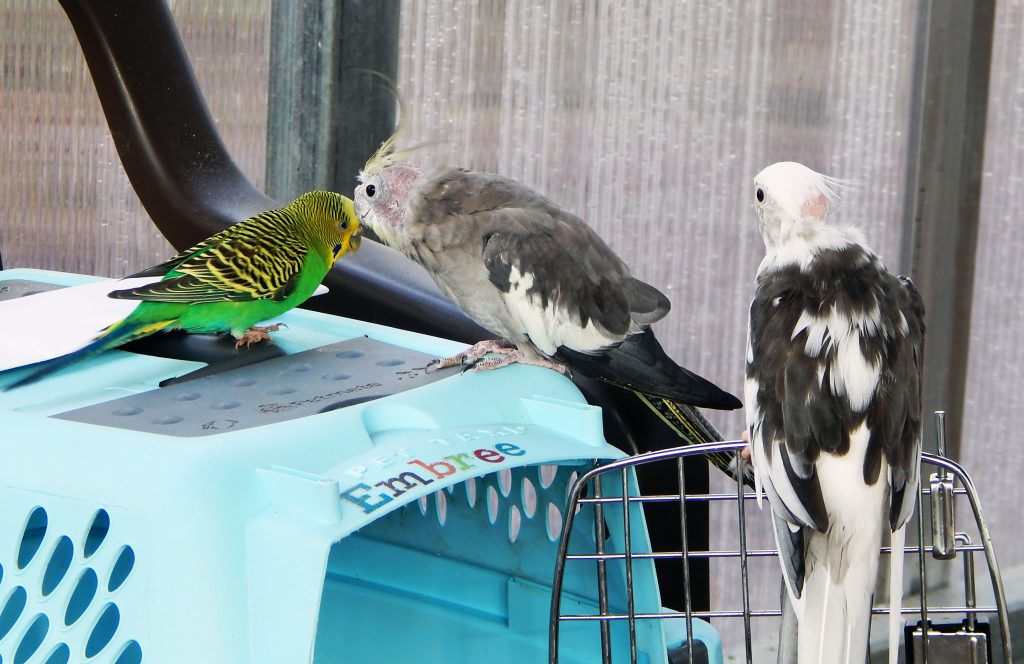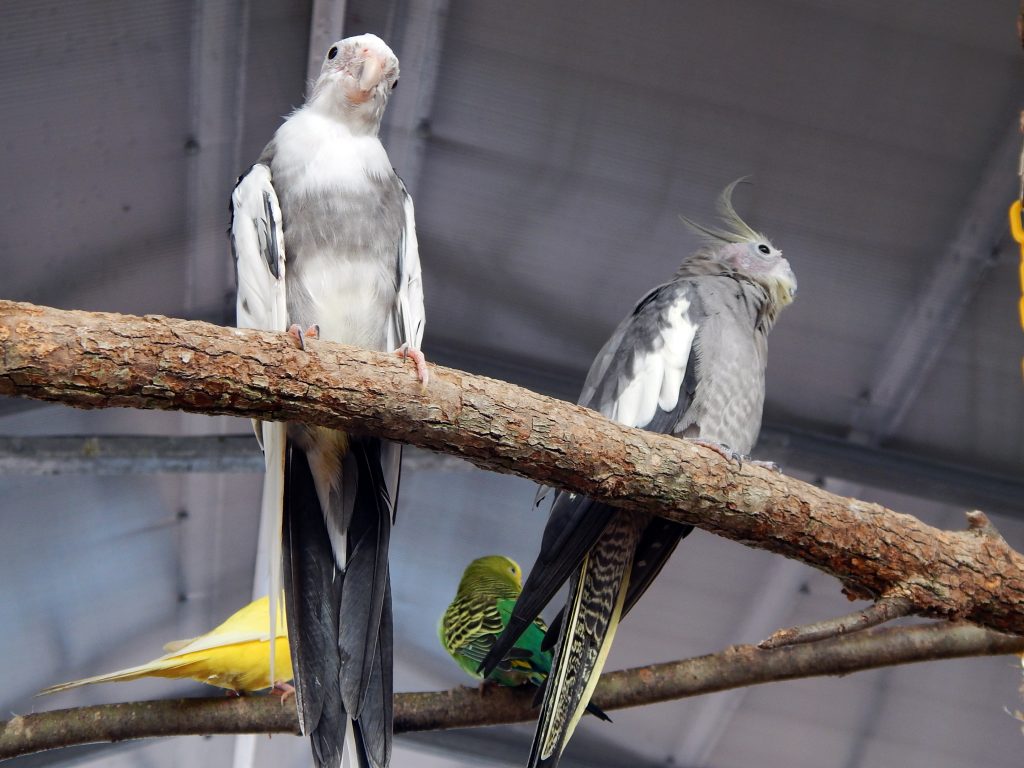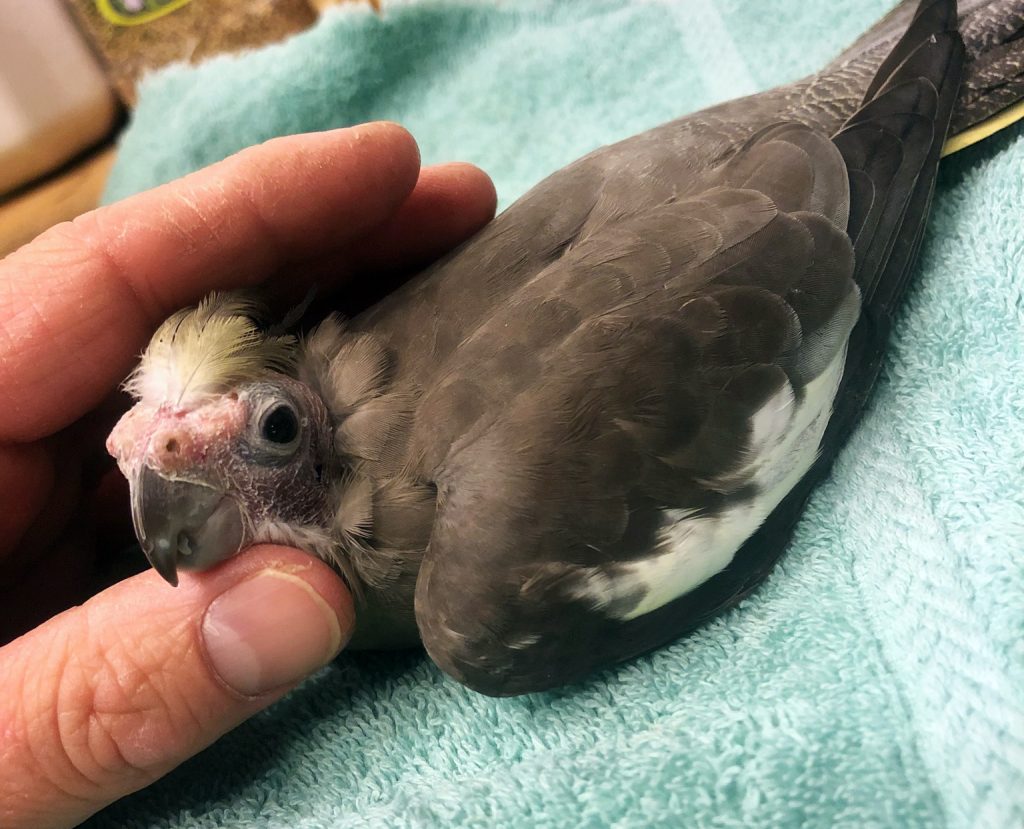It took a lot of courage to let them go. But it was easy to set them free. And if I ever doubt that it was the right thing to do, I just whisper to myself these words of the late, great Maya Angelou: “The caged bird sings with a fearful trill of things unknown but longed for still, and his tune is heard on the distant hill, for the caged bird sings of freedom.”
Her words, a metaphoric reflection on oppression, remind me that we all seek it–that elusive freedom–and few truly attain it. Yet, as Ms. Angelou once said, “The truth is, no one of us can be free until everybody is free.”
*
I was about 12 years old when a pair of cockatiels fell into my home. They’d been used as some sort of children’s educational act, but once their mysticism had faded, they had been relegated to a cage and left to their own devices.
So he, a gregarious grey and white bird with a permanent smirk deceptively etched into his feathered face, had taken to grooming her… And grooming her… And grooming her. Endlessly–until she, once a sleek white-feathered maiden, had morphed into more of a turkey, bald-headed but still irresistibly adorable.
They were soul mates, serenading one another under the sunrise every morning and huddling together for bed under the moonlight.
Then, suddenly, she was gone. Teflon, we concluded–the coating on the pan that cooked our pancakes every morning. A stray whiff of the fumes must have killed her. We hadn’t known it was poison. We were devastated.
He was devastated. He sang for her, day in and day out. A sad, shrill, eternal song–an empty song.
We had to do something, so we did what seemed logical: We drove to the pet store, and we bought another: a lone female, who had already been discarded once and returned to the store. Grey, fiery, full of sass–she was mean and miserable.
Had we known then that almost a third of wild parrot species are classified as threatened because of habitat destruction and capture for the pet trade, according to the Animal Welfare Institute, perhaps we would have done it differently. Had we known that breeders often mass-produce birds in filthy, crowded conditions much like puppy mills, perhaps we would have done it differently. Had we realized that these birds are never truly domesticated and will always be wild animals–born to fly free–yes, we just might have done it differently.
From day one, she hissed. She wanted very little to do with us. But he was a different story.
His eyes shone once more, and his song became bright again. Slowly but surely, her walls crumbled. She began to nestle up to him. And over the years, they became completely inseparable, each shining a light into the darkness that had overtaken both of their souls in the aftermath of abandonment.
But he proved that some habits die hard, as he didn’t delay in grooming her in the same way as her predecessor, replacing her shiny grey plumage with a bare pink skull.
I went to college, and I came home. And then I left again, flying off into the adult world. But they stayed. And upon my return, I always was greeted by his sweet song and that silly smile and reminded of her elegant aloofness.
The day came when it was time for my parents to make their ultimate move: to the Big Island of Hawaii. En route, tragedy struck when their beloved cockatoo, Lilah, passed away after a series of unforgivable oversights by the airline, airports, and transport company that resulted in him being denied water and food for hours on end. The guilt and loss for my family were crushing and raw. And in those moments, it was quite clear that Willie and Lucy, the bonded cockatiel pair, were not destined to follow my parents to paradise.
Back in Virginia, my wife and I had temporarily taken in the duo, alongside our menagerie of dogs, rabbits, fish, and a potbellied pig. But flight was limited in their small room, and for them, life had to be about much more than fleeting moments of flapping back and forth between the ceiling fan and their cage.
“A free bird leaps on the back of the wind and floats downstream till the current ends and dips his wing in the orange sun rays and dares to claim the sky,” wrote Maya Angelou.
We had known about the nearby Project Perry, also referred to as the Central Virginia Parrot Sanctuary and supported by game show host Bob Barker, for a while. With a mission to “provide exceptional natural environments for [its] residents where they can enjoy the enrichment of flight and the togetherness of flock with excellent care provided by a dedicated team of staff and volunteers,” the sanctuary is working to tackle the massive, growing problem of unwanted captive wild birds–often rejected for being too loud, too unruly, too disruptive–essentially, too wild.
Fortunately, Willie and Lucy were accepted into the sanctuary’s selective “Lifetime of Care” program, in which they could live out the rest of their days in a beautiful aviary with dozens of companion cockatiels and parakeets and surrounded by lush greenery. And while they would not be leaving my family in spirit–we’d continue to provide financial support for their care and be able to visit whenever we liked–their physical absence still pained me.
I wept in the silence after their songs had stopped.
Yes, it took strength to leave them there, but from the moment they climbed out of the carrier and took off in flight, I knew it was where they belonged–the closest habitat to their native Australia they’d ever reach.
I continued to visit when I could, and in the months of intermission, regular text updates and photos from sanctuary founder Matt Smith never failed to light up long, dreary days and weeks. Despite all the new fish in the sea, Willie and Lucy remained a bonded pair, never venturing far from one another.
On my visits, I noticed that they stopped flying down to greet me. They often sat together, perched near the roof of the aviary, surveying their surroundings. But still, he sang that familiar song, and through it I heard peace.
It stung, but I realized they didn’t need me–and that recognition was the biggest gift I could have given them. They were free, and they thrived.
Very recently, Matt solemnly notified me that Lucy had passed away peacefully in his hands, warm and comfortable–loved. By my estimates, she would have been more than 20 years old. I sighed, and then I wept–but inside I knew: this was the perfect ending to her story.
Then I began to worry for Willie. Would that desperate song emerge once more, with sorrowful cries into the night?
But my fears were quelled when my phone buzzed and a 10-second video appeared. In it, Willie and another bird, like two schoolkids on the playground, pecked happily together at the seeds around their feet.
“Maybe he’s on a millet-eating date,” read Matt’s accompanying text.
I just laughed, and I knew then that in that aviary, Willie’s soul had finally been set free. In there, he could heal, and he could truly live.
You can help: Exotic birds need you. Head on over to Project Perry’s page to learn how you can support the sanctuary’s life-saving work!





What a beautiful story. I am a supporter of Project Perry and visit often from upstate NY. Thank you for sharing. I hope I will have your courage as I will be sending my three precious parrots there sometime in the near future.
My name is Matthew in Utah. I took a very strong interest in song birds at a very young age. I tried to raise baby birds from ghe wild; English Sparrows. I didn’t have much luck. I acquired a female cockatiel and we became fast friends. ‘ Mousse ‘ or Mooska, would fly from her cage and land on my shouler, or head. I would say ” I got something for ya” and she would take a seed or grape from my lips. Cricket, a Green cheeked conure c AZ me next into our life ( mine and Mouska’s ). Yes, she would say ‘ Cricket’ and make other sounds. Both birds had their own cages but were only in them for their safety when I was gone. They were both females and laid eggs as an offering to me. Both birds lived 20 years.
Aw, thank you for sharing your story and taking care of them. They sounds like they had a wonderful life with you!
I have a green cheek conure that’s about 3 years old, actually she’s my daughter’s, and we got her from a pet store. They didn’t have her sex found out, we have just figured it out. We have other pets, but Chloe, rules the roost! Unfortunately she attacks our dog Athena, a pit bull cross, and we can’t seem to find anything to get her to stop, time out in her cage isn’t working 😔 any ideas?? 😁
Hi Debbie, I am sorry it took me so long to reply! I hope you have found some answers. I was going to suggest that you search for parrot forums or groups on Facebook, as they often have a lot more experience with bird behavior and can give great advice. Good luck!